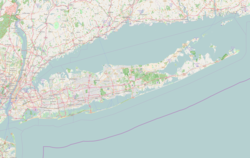Sands-Willets Homestead
Sands-Willets Homestead | |
Village of Flower Hill Landmark | |
 The front of the Sands-Willets Homestead, as seen from Homewood Place in 2023. | |
| Location | 336 Port Washington Boulevard, Port Washington, NY 11050 |
|---|---|
| Coordinates | 40°48′56″N 73°40′51″W / 40.81556°N 73.68083°W |
| Area | Less than one acre |
| Built | Ca. 1735[2] |
| Architect | Sands, John, II; Sands, John, III |
| Architectural style | Greek Revival |
| NRHP reference No. | 85002425[1] |
| Significant dates | |
| Added to NRHP | September 19, 1985 |
| Designated VFHL | November 4, 1996 |
The Sands-Willets Homestead is a historic house and museum located within the Incorporated Village of Flower Hill in Nassau County, on Long Island, in New York, United States.
It is operated as a historic house museum by the Cow Neck Peninsula Historical Society, is designated as a Village of Flower Hill Landmark and a New York State Landmark, and is listed on the National Register of Historic Places.[1][3][4]
Description
[edit]Main House
[edit]The Sands-Willets Homestead is a 20-room, shingled 2-story building with an enlarged porch and porte cochere. The west wing dates to about 1735.[2] It was originally a four-bay, 1+1⁄2-story house with end chimneys over a full-sized basement. The main portion of the house is a Greek Revival–style dwelling built during the first half of the 19th century.[3][5]
When he home was built, it was the centerpiece of a 240-acre (97 ha) farm. At the time, the property stretched from Manhasset Bay at its western edge to Hempstead Harbor at its eastern edge, which was convenient for shipping produce to New York City and points beyond.[4][5] Over time, sections of the farm would be sold to developers and often turned into suburban housing developments, ultimately leading to the property nowadays having an area of less than 1 acre (0.40 ha).[5][6]
The Cow Neck Peninsula Historical Society purchased the home from Eliza Willets in 1976, for the purpose of preserving and restoring it, and turning it into a museum, research, and educational center.[2][3][5]
Barn and garden
[edit]A contributing barn and a garden are also located on the property. The barn, which dates to the late 17th Century, was moved to the property in 1978.[6]
2020s renovations and accessibility upgrades
[edit]The Historical Society received a grant for capital improvements, in December 2020.[2][7] A $125,525 grant from the Robert David Lion Gardiner Foundation enabled the Society to renovate building's porch, and make other improvements, which enabled individuals in wheelchairs, or pushing baby stollers, to share in tours.[8][9] The renovations were made in ways that preserve the original heritage value of the house.[10]
In popular culture
[edit]Scenes for the HBO series Boardwalk Empire were filmed in the Sands-Willets House.[11]
See also
[edit]- The George Washington Denton House - Another historic home in the Village of Flower Hill. This home is also listed on the National Register of Historic Places.
- The Thomas Dodge Homestead - Another historic house museum that the Cow Neck Peninsula Historical Society operates, located in neighboring Port Washington.
References
[edit]- ^ a b "National Register Information System". National Register of Historic Places. National Park Service. March 13, 2009.
- ^ a b c d
Ross Weldon (2020-12-20). "Cow Neck Historical Society receives grant toward Sands-Willets House". Port Washington Times. Archived from the original on 2020-12-21. Retrieved 2020-12-20.
The Sands-Willets House, whose western side was built in 1735 by John Sands III, had a front porch added in the 1850s when its new owner, Edmund Willets, enlarged the home in Greek-Revival style. A member of the Willets family would sell the house to the society in 1967, and the society has taken care of it since then, using it as a museum, education center, and exhibition center.
- ^ a b c "Sands-Willets House". Cnphs. Archived from the original on 2020-12-21. Retrieved 2020-10-20.
- ^ a b "Village of Flower Hill » Village History". villageflowerhill.org. Archived from the original on 2020-10-20. Retrieved 2020-10-20.
- ^ a b c d McMorrow, Fred (1989-12-24). "ABOUT LONG ISLAND; Saving the Sands-Willets House, a Mansion with a Prodigious Past (Published 1989)". The New York Times. p. LI12. ISSN 0362-4331. Archived from the original on 2020-10-21. Retrieved 2020-10-20.
- ^ a b Austin O'Brien (n.d.). "National Register of Historic Places Registration: Sands-Willets Homestead". New York State Office of Parks, Recreation and Historic Preservation. Archived from the original on 2012-10-17. Retrieved 2010-10-30. See also: "Accompanying seven photos". Archived from the original on 2012-10-17. Retrieved 2010-11-02.
- ^ "Sands-Willets House: Porch Access & Stabilization Project: 2021". Cnphs. Retrieved 2023-01-16.
- ^ Weldon, Rose (2020-12-20). "Cow Neck Historical Society receives grant toward Sands-Willets House - Port Washington Times". The Island Now. Retrieved 2023-01-16.
- ^ "Cow Neck Historical Society Receives Gardiner Grant". PRUnderground. Retrieved 2023-01-16.
- ^ Ryan, Caroline (2021-01-07). "Cow Neck Historical Society Receives Gardiner Grant". Port Washington News. Archived from the original on 2023-01-16. Retrieved 2023-01-16.
- ^ Dooley, Emily C. (July 5, 2011). "Village Increasingly a Backdrop for Film, TV". Newsday – via ProQuest.
External links
[edit]
- Flower Hill, New York
- Historic house museums in New York (state)
- Houses on the National Register of Historic Places in New York (state)
- Greek Revival houses in New York (state)
- Houses completed in 1735
- Houses in Nassau County, New York
- Museums in Nassau County, New York
- Tourist attractions in Nassau County, New York
- National Register of Historic Places in Nassau County, New York
- Nassau County, New York Registered Historic Place stubs
- New York (state) museum stubs
- New York State Register of Historic Places in Nassau County





